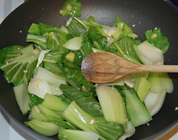Health benefits of bok choy
- Bok choy is one of the popular leafy-vegetables very low in calories. Nonetheless, it is very rich source of many vital phyto-nutrients, vitamins, minerals and health-benefiting anti-oxidants.
- 100 g of bok choy contains just 13 calories. It is one of the recommended vegetables in the zero calorie or negative calorie category of foods which when eaten would add no extra weight to the body but in-turn facilitate calorie burns and reduction of weight.
- As in other Brassica family vegetables, bok choy too contains certain anti-oxidant plant chemicals likethiocyanates, indole-3-carbinol, lutein, zea-xanthin, sulforaphane and isothiocyanates. Along with dietary fiber, vitamins these compounds help to protect against breast, colon, and prostate cancers and help reduce LDL or "bad cholesterol" levels in the blood.
- Fresh pak choi is an excellent source of water-soluble antioxidant, vitamin-C (ascorbic acid). 100 g provides 45 mg or 75 % of daily requirements of vitamin C. Regular consumption of foods rich in vitamin C helps the body develop resistance against infectious agents and scavenge harmful, pro-inflammatory free radicals.
- Bok-choy has more vitamin A, carotenes, and other flavonoid polyphenolic anti-oxidants than cabbage, cauliflower, etc. Just 100 g of fresh vegetable provides 4468 IU or 149% of daily-required levels vitamin A.
- Pak choi is a very good source of vitamin K, provides about 38% of RDA levels. Vitamin-K has a potential role in bone metabolism by promoting osteotrophic activity in bone cells. Therefore, enough vitamin K in the diet makes your bone stronger, healthier and delay osteoporosis. Further, vitamin-K also has established role in curing Alzheimer's disease patients by limiting neuronal damage in their brain.
- Fresh bok choy has many vital B-complex vitamins such as pyridoxine (vitamin B6), riboflavin, pantothenic acid (vitamin B5), pyridoxine, and thiamin (vitamin B-1). These vitamins are essential in the sense that our body requires them from external sources to replenish.
- Further, this leafy vegetable is a moderate source of minerals, particularly calcium, phosphorous, potassium, manganese, iron and magnesium. Potassium is an important electrolyte in the cell and body fluids that helps regulate heart rate and blood pressure. Manganese is used by the body as a co-factor for the antioxidant enzyme, superoxide dismutase. Iron is required for the red blood cell formation.
Here are some of the preparation tips:

Bok choy stir-fry with ginger, garlic, soy sauce and a bit of chili paste.
Photo courtesy: Scott
See the table below for in depth analysis of nutrients: Bok choy (Brassica campestris (Chinensis group)), Nutrition Value per 100 g. (Source: USDA National Nutrient data base) Principle Nutrient Value Percentage of RDA Energy 13 kcal <1 td="td"> Carbohydrates 2.18 g 1.5% Protein 1.5 g 3% Total Fat 0.20 g 1% Cholesterol 0 mg 0% Dietary Fiber 1 mg 2.5% Vitamins Folates 66 µg 16% Niacin 0.500 mg 3% Pantothenic acid 0.088 mg 1.5% Pyridoxine 0.194 mg 15% Riboflavin 0.070 mg 5% Thiamin 0.040 mg 3.5% Vitamin A 4468 IU 149% Vitamin C 45 mg 75% Vitamin K 45.5 µg 38% Electrolytes Sodium 65 mg 4% Potassium 252 mg 5% Minerals Calcium 105 mg 10.5% Iron 0.80 mg 10% Magnesium 19 mg 5% Manganese 0.159 mg 7% Phosphorus 37 mg 5% Zinc 0.19 mg 1.5% Phyto-nutrients Carotene-α 1 µg -- Carotene-ß 2681 µg -- Lutein-zeaxanthin 40 µg --
The Leader
ACTRESS @ CELEBRETIES HOT PHOTOS
Young and Adult Sexual Reprouctive Health
Organic Farming
No comments:
Post a Comment